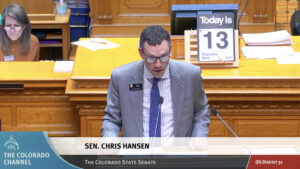Colorado air-quality regulators will turn their attention next to gas-powered lawn and garden equipment. The question is whether they will so far as to ban the sale of that equipment along the Northern Front Range.
Air Quality Control Commission members voted Thursday to set a rulemaking hearing on Dec. 12-15 for Regulation 29, which would place new restrictions on the use of hand-held and push gas-powered equipment. The regulation would begin in 2025, and it follows an executive order issued last week by Gov. Jared Polis that bans use of such equipment at state facilities within the U.S. Environmental Protection Agency’s ozone-nonattainment area by June 2025.
Leah Martland, supervisor of the Colorado Department of Public Health and Environment’s regulatory development and engagement unit, presented the AQCC Wednesday with a proposal to reduce the use of equipment that’s become an increasing target of environmentalists. Gas-powered lawnmowers, weed whackers and other lawn-care instruments are estimated to be responsible for 75% of non-road volatile organic compound emissions in the state — a category that also includes agricultural, aviation, railroad, recreation and commercial equipment.
Dueling proposals on lawn equipment
CDPHE’s proposal would ban the state government from using such equipment statewide from June through August beginning in 2025 and city and county governments from using it during the same high-ozone months beginning in 2026. It would not impact private use of the equipment, and it would not impact use of riding mowers and other such larger equipment needed to maintain bigger areas and fields.

Colorado officials are pushing for more usage of electric lawn equipment, such as this plug-in mower.
An alternate proposal presented at the AQCC meeting Wednesday by Mike Silverstein, executive director of the Regional Air Quality Council, would go significantly further, however. The RAQC is the lead air-quality planning agency for the Northern Front Range, which the EPA has designated to be in severe violation of federal ozone standards.
Beginning in January 2025, the RAQC plan would prohibit sales of gas-powered lawn equipment by all retailers within the nonattainment area, which stretches from Denver’s southern suburbs up to the Wyoming border. It would bar governments in the nonattainment area from using gas-powered equipment from June through August beginning in 2025, and it would ban commercial operators in the nonattainment area from doing the same starting in 2026.
“Really important sector”
The AQCC often decides between CDPHE proposals and alternate proposals or incorporates pieces of both into final rules — it will, for example, consider alternate proposals from the Colorado Chamber of Commerce and Environmental Defense Fund this week when determining new emissions restrictions on large manufacturing facilities. But Silverstein’s announcement that his organization would submit an alternate proposal three months before the hearing on the lawn-equipment proposal sets ups a debate that is likely to extend beyond the AQCC hearing and into public discourse in the coming months.
“This is really a strategy to get at ornamental, urban lawn activities,” Silverstein told the AQCC. “It’s a really important sector to focus on, and we think there are viable alternatives to gas-powered equipment.”
This is not the first time that state officials have discussed limits on the usage of gas-powered lawn equipment, but it’s likely to be the first time that such limits come to fruition.
State Sen. Chris Hansen, D-Denver, proposed a phase-out of gas-powered lawn-equipment sales in the nonattainment area in a 2022 bill but yanked that provision from the bill after receiving significant backlash. Earlier this year, the Legislature approved a modified version of the bill that offers incentives for state residents to buy electric lawn equipment instead of barring such sales.

Colorado state Sen. Chris Hansen speaks in March on the Senate floor about his Senate Bill 16, which created incentives for the purchase of electric lawn and garden equipment.
Public debate set to ramp up
It’s unknown exactly where groups that support overall greenhouse gas emissions reductions will fall in the debate over the two proposals, one of which directly affects only the public sector and the other which could affect private-sector retailers and landscaping companies.
Kirsten Schatz, clean air advocate for the Colorado Public Interest Research Group (CoPIRG), on Wednesday made the broad request for the AQCC to move forward with the rulemaking in December. She argued that retailers already are making the transition to electric lawn equipment and asserted that one hour of operating a gas-powered leaf blower was equal to driving a vehicle for 1,100 miles.
But it’s clear RAQC leaders will push hard for their alternate proposal, which could bring into the debate business interests who may not oppose the CDPHE plan. Silverstein argued that full compliance with the RAQC proposal could cut volatile organic compound emissions by 18 tons per day, accounting for half of the emissions now coming from lawn and garden equipment.
